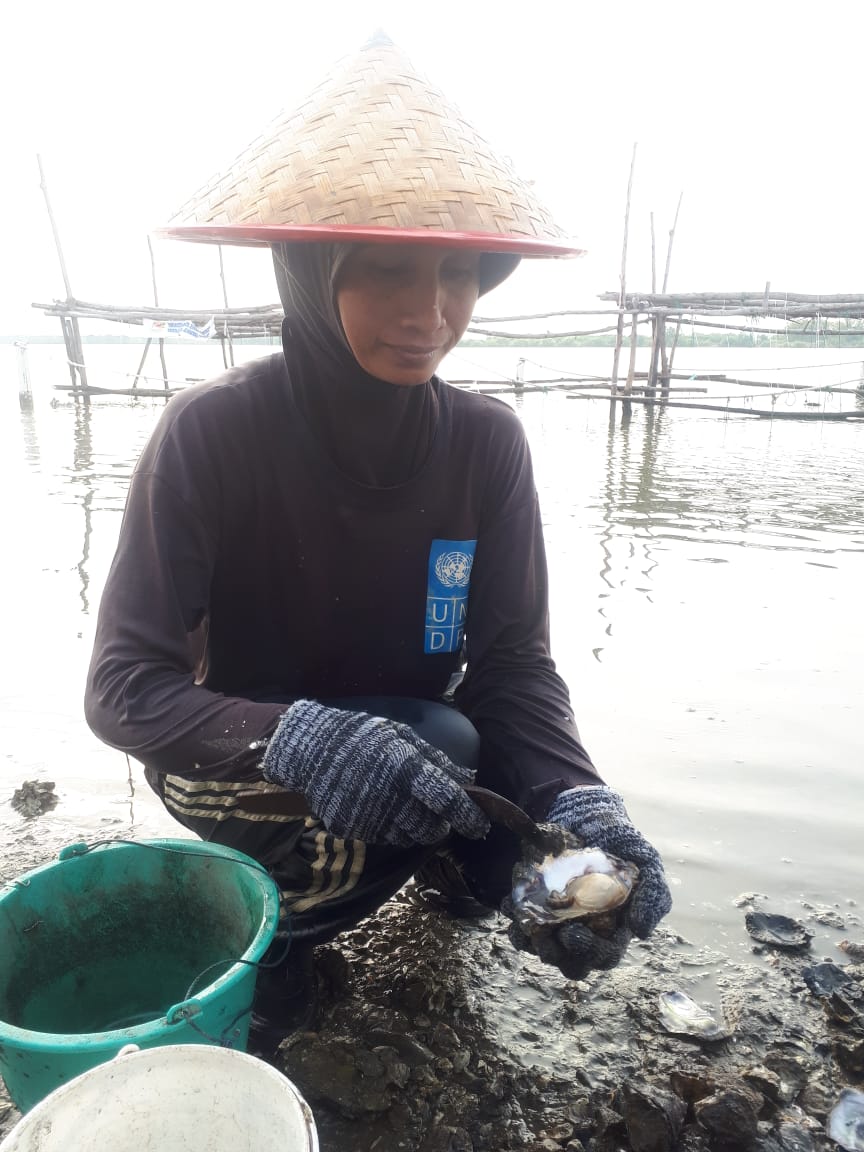Farming Oysters, Farming Resilience
Organization: Natural Aceh
2024 LOCAL ADAPTATION CHAMPIONS AWARD NOMINEE
In Alue Naga, a coastal village in Banda Aceh, Indonesia, communities face the growing threats of climate change, including rising sea levels, coastal erosion, and declining food security. These threats are particularly acute for vulnerable populations, such as women and families who survived the devastating 2004 tsunami. The region’s environmental degradation and unpredictable climate patterns have made traditional livelihoods like fishing and farming increasingly challenging, pushing local communities to seek innovative solutions.
A Community-Driven Oyster Farming Response
To address these climate-related challenges, the nonprofit organization Natural Aceh initiated an oyster farming project that is both climate-smart and community-focused. The project, led by 157 local women—many of whom were directly affected by the tsunami—uses recycled materials such as old tires and water jugs to create sustainable oyster farms along the coastline. These oyster farms not only help restore marine ecosystems but also provide a much-needed source of income for the women involved.
Financial Management and Community Oversight
The 157 women formed a committee to oversee the allocation and expenditure of funds, with village elders and representatives from local women’s groups also participating in financial oversight. These community leaders provided guidance to ensure that financial practices adhered to community norms and aligned with the project’s objectives. Through open meetings, regular reporting, and accessible financial records displayed on notice boards, the project maintains transparent financial processes and devolved decision-making to community members.
“We are not just farming oysters; we are farming resilience,” says Zainal Abidin Suarja, Founder of Natural Aceh. “These women, who have already survived a disaster, are now leading the way in climate adaptation by using local resources and sustainable practices.”

Displaying farmed oysters
Empowering Women and Collaborating Across Sectors
The oyster farming initiative exemplifies locally led adaptation, with the women of Alue Naga playing key leadership roles. Many of these women had been left economically vulnerable after the 2004 tsunami. Through this initiative, they’ve gained financial independence and improved their families’ well-being while contributing to environmental conservation.
The project is also an example of how local knowledge and ingenuity can drive sustainable solutions. The women selected the materials for the oyster farms themselves, ensuring the methods used are both practical and environmentally friendly. By using low-tech, recycled materials, the initiative keeps costs low and reduces waste, making the project scalable and replicable in other regions.
The project collaborates with local and provincial governments in Aceh for support in implementation, community engagement, and alignment with sustainability policies. Local government provides training, oversight, and resources, while the provincial government ensures policy integration, funding, and coordination across districts.
Local universities provide essential research and technical support, involving students and offering training to community members engaged in oyster farming. These collaborations strengthen the technical foundation of the project, equipping community members with valuable skills for sustainable practices.
Transforming Livelihoods and Restoring Ecosystems
The Alue Naga oyster farming initiative has already delivered significant economic and environmental benefits. The project has led to a 300-fold increase in income for the village, providing financial stability to the women and their families. This newfound economic security has allowed families to invest in education, healthcare, and other essential needs, strengthening the community’s overall resilience to climate change.
Environmentally, the project has contributed to the restoration of local ecosystems. Oysters play a crucial role in filtering water and supporting marine biodiversity, making them an ideal sustainable food source. As the oyster farms grow, they improve water quality and help rejuvenate the coastal environment, offering long-term ecological benefits. The use of recycled materials also aligns with broader efforts to reduce waste and promote a circular economy.
A Blueprint for Expansion and Lasting Change
The project’s success has sparked plans for expansion. Natural Aceh has already replicated the oyster farming model in eight districts across Aceh, adapting the core principles to suit the environmental conditions of each region. The goal is to scale up further, bringing climate-smart food production and economic opportunities to more vulnerable communities.
With additional funding, Natural Aceh aims to train more women, increase production capacity, and establish new oyster farms in other coastal areas threatened by climate change. “This will not only provide more jobs but also strengthen food security for more communities,” says Suarja. The project stands as a powerful example of how locally led, sustainable solutions can make a meaningful difference in the fight against climate change while empowering marginalized groups.